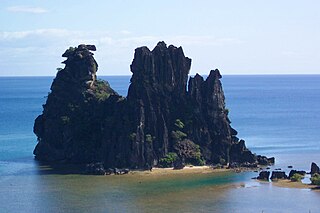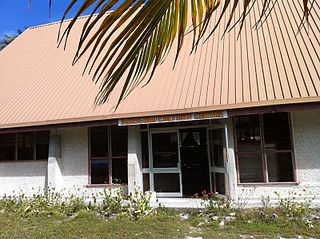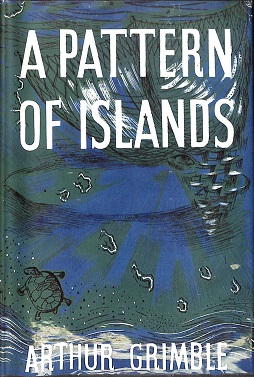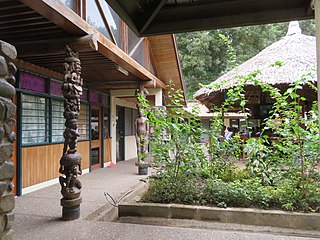Related Research Articles

Fiji is divided administratively into four divisions, which are further subdivided into fourteen provinces. Each province has a provincial council.
"God Save Our Solomon Islands" is the national anthem of Solomon Islands. It was adopted in 1978 following independence. The lyrics were authored by Fijian-born husband and wife Panapasa and Matila Balekana, and the music was composed by Panapasa.

Hienghène is a commune in the North Province of New Caledonia, an overseas territory of France in the Pacific Ocean. It is located on a bay called Hienghène Bay, known for its eroded limestone islets.

Islam in New Caledonia is a minority faith, consisting of 2.6% of population or 6,357 people. The community is largely ethnic Javanese, and primarily speaks French, and Arabic or Indonesian, causing a linguistic gap between them and neighbouring Anglophone Muslim communities in Australia and Fiji. There is an Islamic centre in Nouméa, and another in Bourail catering to Algerian-Caledonians.

Bikenibeu is a settlement in Kiribati. It is located close to the southeastern corner of the Tarawa atoll, part of the island country of Kiribati. It is part of a nearly continuous chain of settlements along the islands of South Tarawa, which are now linked by causeways. The low-lying atoll is vulnerable to sea level rise. Rapid population growth has caused some environmental problems. Kiribati's main government high school, King George V and Elaine Bernachi School, is located in Bikenibeu, as well as the Ministries of Environment and Education.

Ati George Sokomanu, is a Vanuatuan politician who served as the first president of Vanuatu from 1984 to 1989.

Sale'aula is a village on the central north coast of Savai'i island in Samoa and is the traditional center of the Gaga'emauga political district. Chief council meetings are held at Vaitu’utu’u malae in the village. The village has a population of 600.

Teo Tuvale was a notable Samoan historian who served terms as Chief Justice and Secretary to Government in Samoa during the era of colonialism.
Sapa'u Ruperake Petaia is a poet and writer from Samoa. His poem Blue Rain became the title of a collection of his poems first published in 1980 with later editions in the 1990s. The collection included the satirical poem Kidnapped (1974) which explores themes about the loss of traditional Samoan knowledge. Like other Samoan writers such as Albert Wendt, Petaia's work explores themes about the effects of colonialism and Western influences on Samoan culture and society.

Mata'afa Iosefo was a Paramount Chief of Samoa who was one of the three rival candidates for the kingship of Samoa during colonialism. He was also referred to as Tupua Malietoa To'oa Mata'afa Iosefo. He was crowned the King of Samoa on 15 November 1898.

Matāʻafa is one of the four paramount tama-a-ʻaiga titles of Samoa. It is one of two such titles originating from the Atua district at the east end of Upolu island and has its historical seat in the village of Amaile. Prominent holders of the title include Matā'afa Iosefo of Falefa, one of the three rival candidates for the kingship of Samoa during the early colonial period, Matāʻafa Faumuina Fiame Mulinuʻu I of Lepea and Lotofaga, who became leader of Samoa's pro-independence Mau movement after Tupua Tamasese Lealofi III's assassination; and his son Fiame Matāʻafa Faumuina Mulinuʻu II (1921–1975), the first Prime Minister of Samoa.

A Pattern of Islands is a memoir by Sir Arthur Grimble recounting his time in the Gilbert and Ellice Islands as a cadet officer and Resident Commissioner between 1914 and 1933. The book, which was first published by John Murray in 1952 and was republished by Eland in 2010, gives an attractive account of island life and colonial rule, based on Grimble's extensive engagement with the islanders. The book was adapted as a film, Pacific Destiny, released in 1956, and Grimble wrote a sequel, Return to the Islands.
A fakanau is a traditional Tuvaluan male dance, accompanied by singing and rhythmic clapping.
Honiara Solomon Islands College of Higher Education (SICHE) is a university in Honiara, Solomon Islands; apart from the University of the South Pacific, which has a satellite campus in the country. It is located in eastern Honiara, south of Honiara Golf Club, just to the southwest of King George VI National High School.
Woodford International School, also called the International School, is a school in Honiara, Solomon Islands; apart from the Honiara Solomon Islands College of Higher Education (SICHE), a university in Honiara; and the University of the South Pacific (USP) Solomon Islands Campus. The school is located just to the northwest of the Solomon Islands College of Higher Education.

The University of the South Pacific (USP) Solomon Islands Campus is a satellite campus of the University of the South Pacific, based in Honiara, Solomon Islands; apart from the Honiara Solomon Islands College of Higher Education (SICHE) a university in Honiara; and the Woodford International School. The University of the South Pacific campus is located near Chinatown, about 75 metres (246 ft) to the southwest of Lawson Tama Stadium. It offers continuing and community education courses to the South Pacific member countries. Some of the major disciplines in which courses are offered on semester basis are Arts, Law and Education, Business and Economics, Science, Technology and Environment and other disciplines with a gamut of subjects in each discipline. The duration of courses varies from 10 to 32 hours of teaching spread over a number of weeks. Subjects taught based on regional requirements could be in the fields of "computer skills, languages, bookkeeping, mathematics, business studies, economics, creative writing, community development skills, literature, handicrafts, floral arts, fabric arts, woodcarving, fine arts, carving, poetry, music, video production, leadership skills, health studies, public speaking, problem-solving and general literacy skills.” An important programme that is advocated in the USP is to establish an education programme "through distance and flexible learning”, which the relevant texts to learn and teach are prepared in the Laucala Campus in Fiji and adopted in the campuses of all the USP universities across the South Pacific.
Ura is one of the popular traditional dances of the Cook Islands, a polynesian sacred ritual usually performed by a female who moves her body to tell a story, accompanied by intense drumming by at least five drummers. Moving the hips, legs and hands give off different gestures to the audience to tell a tale, typically related to the natural landscape such as the ocean and birds and flowers, but also feelings of love and sadness. The ura dance has three distinct components; the ura pa'u, korero (legends) and kaparima. To perform the ura, women typically wear a pareu and a kikau (grass) skirt, with flowers and shell headbands and necklaces known as ei. Men during the dance are said to "vigorously flap their knees in a semi-crouched position while holding their upper bodies steady", and they typically wear kikau skirts and headbands. The drumming group, an integral part of the Ura, typically consists of a lead drummer, support lead, a double player playing wooden gongs, and two other players playing skin drums. The finest performances of the Ura are put on in Rarotonga.
George Austin Woods was a British navy officer who served as premier of the Kingdom of Viti between May 1872 and 1874.
Tui Sabeto is the traditional Fijian title of the Paramount Chief of Sabeto or Betoraurau, a 5-minute drive from the north of Nadi International Airport. The Tui Sabeto exercises chiefly authority over the villages of Koroyaca, Narokorokoyawa, Natalau, Naboutini and Korobebe.

Squatting in Fiji is defined as being "a resident of a dwelling which is illegal according to planning by-laws regardless of whether the landowner has given consent". As of 2018, an estimated 20% of the total population was squatting, including people living on land owned by indigenous clans with informal permission. Most squatters are on the larger islands such as Vanua Levu and Viti Levu.
References
- ↑ A. A. J. Jansen; Susan Parkinson; A. F. S. Robertson (1990). Food and Nutrition in Fiji: Food production, composition, and intake. editorips@usp.ac.fj. p. 393. ISBN 982-02-0060-1.
- ↑ Joeli Veitayaki (1995). Fisheries development in Fiji. editorips@usp.ac.fj. p. 66. ISBN 982-02-0104-7.
- ↑ Dick Watling; Stuart Chape (1992). Environment, Fiji. International Union for Conservation of Nature. p. 65. ISBN 982-301-001-3.